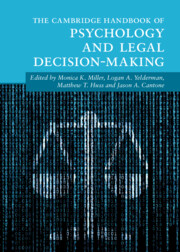Book contents
- The Cambridge Handbook of Psychology and Legal Decision-Making
- Cambridge Handbooks in Psychology
- The Cambridge Handbook of Psychology and Legal Decision-Making
- Copyright page
- Dedication
- Contents
- Figures
- Tables
- Editors
- Contributors
- Part I Introduction Chapters
- Part II Pretrial Phase Decision-Making
- Part III Trial Phase Decision-Making
- Part IV Postconviction Phase Decisions
- Part V Other Legal Decision-Making
- 34 Decision-Making in Immigration Court
- 35 Evaluation Decisions by Psychologists about Causation and Damages in Personal Injury and Employment Discrimination Cases
- 36 Factors Influencing the Decision to Commit White-Collar Crime
- 37 Tort Law Decision-Making
- 38 Judicial Decision-Making in Juvenile Dependency and Juvenile Justice Cases
- 39 Legislative Decision-Making
- 40 Decision-Making in Alternative Dispute Resolution
- 41 Criminal Decision-Making
- 42 Social Worker Decision-Making
- 43 Decision-Making in Civil Matters
- Part VI Perspectives from the Field
- Part VII Conclusion
- Index
- References
34 - Decision-Making in Immigration Court
from Part V - Other Legal Decision-Making
Published online by Cambridge University Press: 22 February 2024
- The Cambridge Handbook of Psychology and Legal Decision-Making
- Cambridge Handbooks in Psychology
- The Cambridge Handbook of Psychology and Legal Decision-Making
- Copyright page
- Dedication
- Contents
- Figures
- Tables
- Editors
- Contributors
- Part I Introduction Chapters
- Part II Pretrial Phase Decision-Making
- Part III Trial Phase Decision-Making
- Part IV Postconviction Phase Decisions
- Part V Other Legal Decision-Making
- 34 Decision-Making in Immigration Court
- 35 Evaluation Decisions by Psychologists about Causation and Damages in Personal Injury and Employment Discrimination Cases
- 36 Factors Influencing the Decision to Commit White-Collar Crime
- 37 Tort Law Decision-Making
- 38 Judicial Decision-Making in Juvenile Dependency and Juvenile Justice Cases
- 39 Legislative Decision-Making
- 40 Decision-Making in Alternative Dispute Resolution
- 41 Criminal Decision-Making
- 42 Social Worker Decision-Making
- 43 Decision-Making in Civil Matters
- Part VI Perspectives from the Field
- Part VII Conclusion
- Index
- References
Summary
Immigrants in the United States without proper documentation face the risk of being subject to deportation (“removal”) proceedings and being detained. Decisions about deportation and immigration detention are made by immigration judges (IJs) in immigration courts (ICs) around the country. Some applications are also decided by the United States Citizenship and Immigration Services (USCIS) and are characterized as “benefits” rather than relief. Psychological evidence is a key component of many forms of removal relief and benefits (e.g., asylum applications, hardship, competency). Decisions made by IJs, immigration attorneys, and mental health professionals in IC can have serious consequences for immigrants, including deportation and detention. This chapter reviews some of the psychological issues involved in immigration law and the legal decision-making involved in removal relief applications. It also outlines the ways in which forensic mental health assessments can aid IJs in their decision-making process and offers recommendations for research and policy in this area.
Keywords
- Type
- Chapter
- Information
- The Cambridge Handbook of Psychology and Legal Decision-Making , pp. 525 - 539Publisher: Cambridge University PressPrint publication year: 2024



